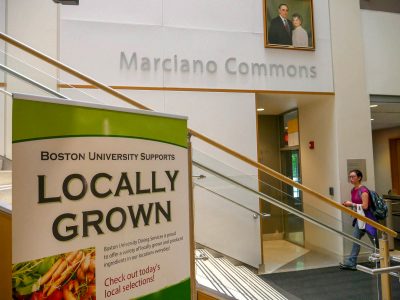
Boston University Dining Services promotes its locally-sourced process in signs in dining halls and its website, and this summer, non-GMO restaurant Life Alive created buzz on campus when it opened a location on Commonwealth Avenue. From East to West at BU, initiatives to offer healthy, organic food abound.
Campus dining halls offer vegan and gluten-free options and some organic foods, including bean and alfalfa sprouts, coffee, yogurt, honey, beans, tofu, soy milk and oats. Dining Services couldn’t be reached for comment regarding the presence of GMOs in the food, but in recent years, concern has increased over potential consequences caused by GMOs.
According to Purdue Agriculture, GMOs are foods in which scientists tweaked their genetic codes to have desired traits. This is done by injecting a gene from one organism into the cell of another. The modifications can enhance crop yields and nutritional value of food and repel insects that prevent healthy growth.
Vinodh Kurella, a principal scientist for Merrimack Pharmaceuticals, said he is determined to end the negative connotation of GMOs.
“People, whenever they hear new technology, feel that it can have a negative impact, especially with food,” Kurella said.
He described the positives of GMOs using the example of Arctic apples, which contain genes that make the fruit stay fresh longer.
Kurella said he previously worked at the company Intrexon, which focuses on new DNA technology, and there he examined genetically-modified products. Through this experience, Kurella explained he became familiar with the positive uses for foods that have been cross-bred and that he wants the public to see the benefits as well.
“I can share my perspective so people can know what GMOs are and what they do instead of being fearful,” Kurella said.
According to The New York Times, the American Medical Association, National Academy of Sciences, American Association for the Advancement of Science and the World Health Organization affirm the statistic that almost 90 percent of scientists believe in the safety of GMOs.
However, Kurella said slight concerns have been raised with GMOs. Kurella specifically referenced that when a peanut was crossed with a soybean to enhance its level of protein, those who had an allergy to peanuts and ate these genetically-modified soybeans developed allergies to soybeans. Kurella stated this effect is minimal compared to the benefits of GMOs.
Tallulah Bark-Huss, a sophomore in the Sargent College of Health and Rehabilitation Sciences, said she was wary of GMOs and felt like avoiding them was best.
“The long-term health effects of GMOs are pretty unknown,” Bark-Huss said. “I would much rather see all organic and local food options.”
Bark-Huss said she also felt concerned about the corruption within the agriculture industry, especially regarding larger companies such as Monsanto. Monsanto has been accused of spending millions of dollars in order to stop mandatory labeling laws.
Joan Salge Blake, clinical associate professor in Sargent, shed light on recent developments that investigated GMOs’ effect on health. According to a 2016 report from the National Academies of Sciences, Engineering and Medicine that examined studies and the latest research, there is no substantial evidence that GMOs are a danger in foods.
“I think this report … finally puts to rest that people have to worry about GMOs,” Blake said.
Blake said students shouldn’t worry about GMOs in their produce or dining hall foods, but rather that they are getting enough fruits and vegetables in their diets.
“Most Americans are not getting enough,” she said. “We’re supposed to be getting four cups of fruits and vegetables a day, and we’re falling short on that.”
She insists that foods in BU dining halls may not have as many GMOs as students might think.
“There is this perception that science is not good or evil,” Kurella said. “I think that’s where the negativity comes from.”


















































































































Siobhan Flynn • Sep 23, 2018 at 7:16 pm
Also didn’t realize that genetic modification has been causing food allergies. That was really shocking and disheartening to read because I actually developed an allergy to several beans including soybeans around the age of 8, having had a peanut and tree nut allergy since birth. It’s sad to realize that maybe the advancement of science may have caused the development of those additional allergies which have cost me my health and money.
Siobhan Flynn • Sep 23, 2018 at 7:13 pm
There are a few other problems with GMO’s that people often don’t consider. Some crops are modified to be resistant to herbicides and pesticides which allows farmers to heavily spray down their crops to prevent the growth weeds and to stop bugs from eating crops. As a result, Round Up, a popular weed killer, is being doused on plants, and it has be detected in human urine in trace amounts because of how much is used on crops that we consume daily. Even though plants that have been genetically modified may not actually harm people, the growing use of Round Up is concerning because it does contain carcinogens. The overuse of pesticides is problematic because bugs and pests adapt to be resilient towards these chemicals. This renders pesticides completely useless against new generations of pests that have adapted to their overuse. Even if used properly, in moderation, a lot of pesticides will no longer have their desired affect on these stronger bugs. As a result, farmers will use stronger, more concentrated pesticides that will actually be effective. The worst part is, these herbicides and pesticides also runoff into our streams and rivers that host many other ecosystems and our water supply. GMO’s have really allowed us to tear apart nature far too much.
Nicole Yaciw • Sep 23, 2018 at 5:53 pm
What horse sh*t.
You have a pharmacuetical scientist thinking he’ll end the REALITY that GMO’s are garbage? And news flash! They do NOT in the long term prevent insects. What a joke!